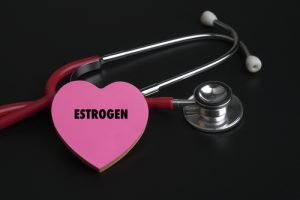The heartbeat is a two-part pumping action that takes only a second to complete from start to finish. Like many biological functions, most of the time, we forget this action is taking place, that is, until something starts to feel off, such as a fluttering or pounding sensation in the chest. These sensations are known as heart palpitations. Although they can be worrisome, heart palpitations are usually harmless and often go away just as quickly as they came on.
Of course, chronic heart palpitations are another matter entirely, as they can suggest an underlying health issue requiring medical intervention. For example, one study published by Harvard Health Publishing noted that dehydration, low potassium, and low blood sugar all go hand-in-hand with heart palpitations. But it doesn’t end there insofar as some studies have also discovered a possible relationship between low estrogen and the risk for heart palpitations.
Low Estrogen and Heart Palpitations: What You May Not Have Known About Menopause
While stress, anxiety, depression, strenuous exercise, and underlying health problems, such as dehydration, low potassium, and low blood sugar, can all trigger heart palpitations, it turns out low estrogen levels can overstimulate the heart, leading to these palpitations, as well.
In regards to what constitutes low estrogen, in women it has a lot to do with where they are in their menopause journey. Normal estradiol levels, the primary estrogen in women, ranges from 30 to 400 picograms per milliliter (pg/mL) in premenopausal women, while postmenopausal women tend to fall somewhere in the 0 to 30 pg/mL range.
While estrogen-related palpitations can occur in men and women with below-average estrogen levels, it is far more common among women, not surprisingly, it is particularly common in those who are going through, or who have already settled into, menopause. Along with symptoms like weight gain, hot flashes, and vaginal dryness, low estrogen levels resulting from menopause can also add in the effect of overstimulation of the heart. A study published in the Journal of Menopause noted that 18 to 46 percent of menopausal women say they experience heart palpitations alongside other symptoms typical of menopause.
How Low Estrogen Levels Trigger Heart Palpitations

- Breathlessness
- High blood pressure
- Elevated cholesterol levels
Many physicians and medical scientists believe that higher levels of estrogen that exist in a woman’s body before menopause help protect the blood vessels from damage that would otherwise lead to various cardiovascular events, including heart palpitations. But as estrogen levels start to decline due to menopause, such protection eventually follows suit. In one study, in particular, published by the National Institutes of Health, researchers revealed that atherosclerosis, also known as hardening of the arteries, can increase a woman’s chances of experiencing heart palpitations, not to mention a heart attack or stroke. Some of the things that can lead to atherosclerosis onset in women include the following:
- A diet high in saturated fats
- High blood pressure
- High cholesterol and triglyceride levels
- Leading a sedentary lifestyle
- Obesity
- Smoking
- Diabetes
There is even some evidence that menstrual cycle length during perimenopause may also have indicators to predict possible atherosclerosis onset.
What You Can Do

- Avoiding compromising habits such as cigarette smoking
- Avoiding excessive alcohol consumption
- Maintaining a healthy weight
- Participating in regular physical activity
- Getting adequate quantity and quality sleep
- Consuming a healthy diet
In addition, following up with doctors for regular checkups to properly monitor and treat any health concerns are all vital when it comes to limiting risk factors that may be associated with atherosclerosis and other heart concerns.
When to Seek Help from a Physician
Generally speaking, heart palpitations alone do not require a trip to the doctor’s office since they tend to resolve themselves fairly quickly. However, recurring heart palpitations, especially if they last for more than just a few seconds at a time, should be discussed with a physician sooner rather than later. The same applies if those palpitations are coupled with dizziness, fainting, breathing difficulty, or severe chest pain. During your medical office visit, a doctor will likely perform a physical exam and order diagnostic tests to determine the root cause of your symptoms and if needed, begin outlining a course of treatment.
Conclusion
With multiple studies showing that low estrogen and heart palpitations go hand-in-hand, there is plenty of evidence that makes it crystal clear how such a combination can put women at risk of suffering additional conditions, such as heart attack, stroke, and other cardiovascular problems. That said, more studies are continuing to look into further understanding how low estrogen levels, or a full-on estrogen deficiency, impacts the female cardiovascular system, in hopes of gaining additional knowledge needed to prevent and better treat such issues in the future.





